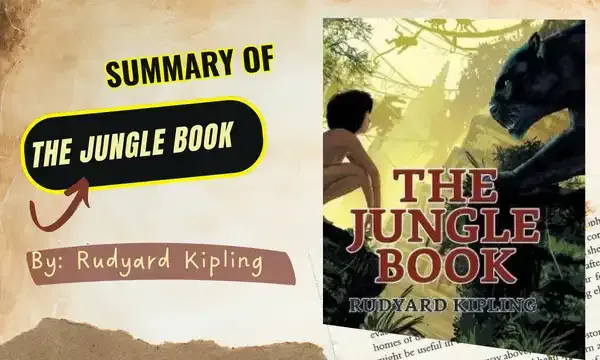The Jungle Book by Rudyard Kipling explores the relationship between humans and animals, highlighting themes of identity, belonging, and the laws of nature.
 |
| Summary of The Jungle Book by Rudyard Kipling |
The general idea of The Jungle Book
- Identity and Belonging: The book examines the struggle of Mowgli, a human child raised by wolves, as he tries to find his place in the jungle. It raises questions about what defines one's identity and where one truly belongs.
- Mowgli's internal conflict between his human upbringing and his connection to the animal world emphasizes the complexity of identity.
- The presence of different animal species in the story highlights the diversity of identities and the potential for unity despite differences.
- Law of the Jungle: Kipling introduces the concept of the "Law of the Jungle," a set of rules that governs the animal society. These laws reflect the balance of power, hierarchy, and survival instincts.
- The Law of the Jungle acts as a framework for understanding the relationships and dynamics between different species.
- Kipling explores the consequences of breaking these laws and the importance of cooperation within the animal kingdom.
- Power Dynamics and Colonialism: Kipling's depiction of the human characters, particularly the British colonizers, reflects the imperialistic ideologies of the time. The book indirectly criticizes the exploitative nature of colonial rule through the contrast between human and animal societies.
About the author of The Jungle Book
Rudyard Kipling (1865-1936) was an English writer who spent his early years in India. He drew inspiration from his experiences in the British Empire to write stories that explored the complexities of identity, society, and colonialism. Kipling's background in India allowed him to offer unique perspectives on the themes present in "The Jungle Book."
Chapters of The Jungle Book
"Mowgli's Brothers": Introduces Mowgli and his adoption by a wolf pack.
"Kaa's Hunting": Focuses on Mowgli's encounters with the python Kaa and his interaction with other jungle creatures.
"Tiger! Tiger!": Mowgli's confrontation with Shere Khan, the tiger, and his ultimate triumph.
"The White Seal": A separate story following the adventures of a white seal named Kotick.
"Rikki-Tikki-Tavi": Another standalone tale about a mongoose named Rikki-Tikki-Tavi and his fight against venomous snakes.
"Toomai of the Elephants": Mowgli witnesses the dance of the elephants and gains insights into their world.
"Her Majesty's Servants": An exploration of the lives and roles of different working animals in human society.
"The King's Ankus": Mowgli discovers a treasure and faces the temptations and dangers associated with it.
"Quiquern": A tale of the Inuit boy Quiquern and his journey in the frozen North.
"Red Dog": Mowgli's encounter with a loyal and protective dog named Gisborne.
"The Spring Running": Mowgli prepares to leave the jungle and join the world of humans.
Conclusions of The Jungle Book
The struggle for identity and a sense of belonging is a universal human experience, as depicted through Mowgli's journey.
The laws that govern society may differ between humans and animals, but there are common threads of cooperation, hierarchy, and survival instincts.
Kipling critiques the oppressive nature of colonialism through his portrayal of human characters and their interactions with the animal world.
The Jungle Book in relation to other books
"The Jungle Book" stands out as a classic work of children's literature that delves into complex themes. While other books like "Animal Farm" by George Orwell also explore animal allegories, Kipling's work focuses more on personal identity and the interaction between human and animal societies.
The Jungle Book audience
"The Jungle Book" is primarily targeted at children and young adult readers. However, its rich storytelling and thought-provoking themes have made it resonate with readers of all ages.
The publication date of The Jungle Book
"The Jungle Book" was first published in 1894 by Macmillan & Co.
Recommendations for other books
Other similar books that explore similar themes of identity, belonging, and human-animal relationships include:
- "Watership Down" by Richard Adams
- "Black Beauty" by Anna Sewell
- "The Call of the Wild" by Jack London
